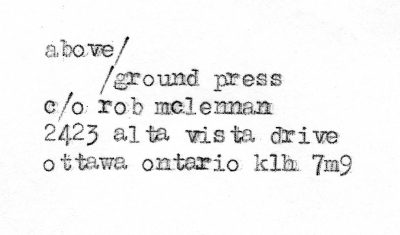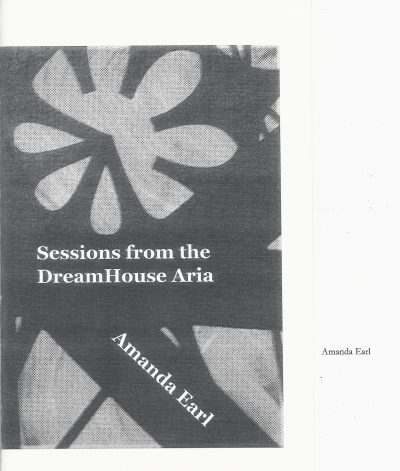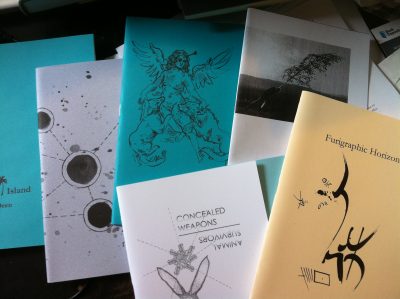
Founder: rob mclennan
Born in Ottawa, Canada’s glorious capital city, rob mclennan currently lives in Ottawa, where he is home full-time with the two wee girls he shares with Christine McNair. He is the author of three works of fiction — white (Mercury Press, 2007), Missing Persons (Mercury Press, 2009) and The Uncertainty Principle: stories, (Chaudiere Books, 2014) — as well as two collections of literary essays, a tourist guide to Ottawa and more than two dozen full-length poetry titles, the most recent of which include A halt, which is empty (Mansfield Press, 2019) and Life sentence, (Spuyten Duyvil, 2019), with the book of smaller forthcoming in 2022 from University of Calgary Press. His latest title is the chapbook Twenty-one stories, (above/ground press, 2020). He won the John Newlove Poetry Award in 2010, the Council for the Arts in Ottawa Mid-Career Award in 2014, and was longlisted for the CBC Poetry Prize in 2012 and 2017. In March, 2016, he was inducted into the VERSe Ottawa Hall of Honour.
An editor and publisher, he runs above/ground press, Touch the Donkey (touchthedonkey.blogspot.com) and periodicities: a journal of poetry and poetics (periodicityjournal.blogspot.com). He is editor of my (small press) writing day, and an editor/managing editor of many gendered mothers. He spent the 2007-8 academic year in Edmonton as writer-in-residence at the University of Alberta, and regularly posts reviews, essays, interviews and other notices at robmclennan.blogspot.com
He is currently working on, among other projects, a novel.
Tell us a bit about your press. How did you start? Who are your influences, in Canada and beyond? What is your mission?
above/ground press launched its first couple of titles in July, 1993, and spent the first decade-plus focused almost exclusively on Canadian poets, producing both single-author chapbooks and more than forty issues of the long poem journal STANZAS. The press is basically me, with whatever access I’ve had over the years to photocopiers, five different long-arm staplers and one larger stapler, and a whole array of cut-and-paste templates. Early influences included bill bissett’s blewointment, bpNichol’s Gronk/ganglia, George Bowering’s IMAGO and Maggie Helwig’s Lowlife Publishing.
The mission is to produce and widely distribute relatively inexpensive chapbooks of quality, engaged writing that I am personally excited by. The press is fueled by my enthusiasms.
Since those early years, the press seems to have expanded exponentially, from producing a half-dozen titles over the space of a calendar year to nearly eighty, including issues of at least three different journals (The Peter F. Yacht Club, Touch the Donkey [a small poetry journal] and G U E S T [a journal of guest editors]). Knowing I have a good amount of subscribers, people who clearly trust my judgement enough to want copies of everything I produce, is certainly an encouragement for me to keep going. But my current publication rate might just be ridiculous. Who knows what I might start next?
What about small press publishing is particularly exciting to you right now?
I’ve been working to establish a prose imprint with the press, one I’ve only just announced. Over the history of the press, I’ve steered clear of producing fiction for the sake of poetry (with one comic book exception back in 1996), but I’ve been more recently prompted by certain frustrations on behalf of certain writers who should be getting more attention (in my mind) than they currently are. The first titles in the series include works by Amanda Earl and myself, with a whole stack of other irons in the fire awaiting their own moments to announce. Otherwise, I’m pretty excited to start working on Karen Schindler’s issue of G U E S T, and Michael Sikkema’s issue, scheduled immediately after. I’ve been collecting an array of amazing work for the next few issues of Touch the Donkey, and even managed to get some chapbook manuscripts out of some authors I haven’t been fortunate enough to publish prior. Honestly, I get a ridiculous amount of satisfaction being able to produce work that excites me and distribute it out into the world, especially now. Pandemic/lockdown means my mailouts are far bigger than they once were. I think these are the days when receiving something in the mail might just be important.
How does your press work to engage with your immediate literary community, and community at large?
I’ve long worked very diligently at catching emerging poets, especially from the Ottawa area, and working to produce their chapbook-length debuts. With the length and stretch of my subscriber base, knowing I’m able to produce a particular writer’s first solo publication is incredibly satisfying, as is being able to produce something new by an established author. I enjoy both the small press folk and the writers you might not necessarily imagine producing small chapbooks at all. I’m also regularly checking in with poets I haven’t published in a while, to see what might be possible to do next.
The journal G U E S T [a journal of guest editors] more overtly works to engage with other small and micro presses in that each issue is guest-edited by a different current or former editor/publisher of a small or micro press, and the list of editors-to-date have been incredible, including Amanda Earl (AngelHousePress), Brenda Iijima (Portable Press at Yo-Yo Labs), Geoffrey Young (The Figures), Anthony Etherin (Penteract Press), D.W. Adams (Train : a poetry journal), Sarah Mangold (bird dog), Susana Gardner (dusie), Kate Siklosi and Dani Spinosa (Gap Riot Press), natalie hanna (battleaxe press), Jenny Penberthy (The Capilano Review), Elizabeth Robinson (EtherDome) and Jim Johnstone (Anstruther Press). I like the difference of opinion, and, obviously, the access that these editors/publishers would have to certain writers that I might never have. Convincing American poet Geoffrey Young to produce an issue (which he agreed to easily)—his press, The Figures, produced books of experimental poetry and prose for thirty-five years, until 2005—felt a coup, given the range of senior writers that I might never have been able to publish otherwise. Lydia Davis? Ron Padgett? Clark Coolidge? Incredible.
How have the current multiple global crises impacted your work with the press?
Given the myriad shut-downs earlier this spring, I’m attempting to be prepared a bit further ahead than normal, and deliberately printed items in June with July, August, September and October release dates. Even if another wave produces repeats of shut-downs (including my print shop), I know, at least, that I can still utilize the mail to send out subscriber envelopes and whatever orders come through. I’ve had certain fall titles on-hand awaiting announcement and mailing now for weeks, even months.
Immediately prior to lock-down, I had been toying with founding a further poetics journal, given the web host for my seventeen seconds: a journal of poetry and poetics disappeared from the internet. Once the lock-downs began, I created the ‘virtual reading series’ as a very deliberate response to the isolations, and they emerged as a precursor to the material I was aiming to launch as periodicities: a journal of poetry and poetics, and both series and journal now exist as a curious extension of the work I’ve been doing with above/ground press.
As I mentioned earlier, I am mailing out more items now than before, prior to lock-down. I’ve an extensive mailing list for Touch the Donkey, but I think I’ve nearly doubled it over the past few months. There are certain people I want to keep track of, touch base with. These isolations are strange for everyone, and we’re all existing with different challenges, resources, complications. I would hope that the appearance of a chapbook or journal through the post might be, at least, some small consideration of outreach.

Love Is not An Algorithm
George Stanley
2020
Every publication, I would say, has its own story. Recently, I produced Love Is not An Algorithm (2020) by Vancouver poet George Stanley. The manuscript emerged from a couple of years of occasional email solicitations I sent his way, asking George if a chapbook interested him at all, or might be possible. He agreed to the idea in theory, although he said he wasn’t writing much. Once or twice a year I would check in to see where he was at, and he eventually sent along a chapbook-length manuscript. I mean, this guy had a first book published by Jack Spicer! He’s a legend in North American poetry and poetics, and much of what he’s done and has been around for has been absolutely incredible, although it still does seem that American attentions seem to only know of what he did prior to the early 1970s, when he moved north across the border, and Canadian attentions seem to only know of what he’s done since. He basically has two entirely separate and equally hefty reputations as a poet.

FLORALS
Misha Solomon
(2020)
A few months ago, Montreal poet Sarah Burgoyne offered two poets she’d encountered during a workshop session, asking if I would be open to considering their chapbook manuscripts. Sarah and I had been discussing the possibility of an above/ground press follow-up to A Precarious Life on the Sea (2016), which led to sending along two manuscripts of her own: TENTACULUM SONNETS (2020), and a collaboration with her mother, Susan Burgoyne, WHERE FOR ART THOUGH (2020). Basically, I trusted Sarah’s judgement, and was fortunate enough to produce two chapbook-length poetry debuts by Montreal poets Rose Maloukis, her Cloud Game with Plums (2020), and Misha Solomon, his FLORALS (2020). Solomon’s chapbook was even his publishing debut, and the poems are lyrically and devastatingly beautiful, open and stunning. There is such an open-heartedness to these poems, and it has been a pleasure to work with him.

Sessions from the DreamHouse Aria
Amanda Earl
2020
And then there’s Amanda Earl’s Sessions from the DreamHouse Aria (2020). Did I mention above/ground has started a prose imprint? I’ve now produced eight chapbooks of hers, going back to 2007, and consider her to be an entirely underrated writer. One of the biggest frustrations about Chaudiere Books no longer being able to produce books is the knowledge that we would have easily have produced a second full-length collection of hers by now. She’s wildly experimental and constantly seeking out new challenges through the lyric, prose, experimental and visual realms, and manages to be incredibly ambitious in her work without ego tripping her up. She is a writer worth paying attention to.
